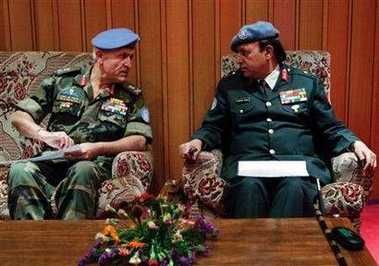|
UN to pull out Western soldiers from Eritrea
(Reuters)
Updated: 2005-12-15 09:11
The United Nations has decided to pull out North American and European
peacekeepers from Eritrea and move them to Ethiopia as the Asmara government
demanded, U.N. officials and diplomats said on Wednesday.
The U.N. Security Council, in an informal session, agreed with U.N. officials
to redeploy about 180 military observers and civilians from the United States,
Canada, Western Europe and Russia from the northeast African country.
Diplomats said other nationalities may also be involved.
The 15-nation body will issue a formal statement later in the day after
consultations with capitals.
The draft statement, obtained by Reuters, said the council was taking a
temporary action "in the interests of the safety and security" of the U.N.
staff.
Tensions along the Ethiopia-Eritrea border have grown in recent weeks on both
sides of the unmarked 620 mile frontier between the Horn of Africa neighbors,
raising fears of a repeat of their 1998-2000 border war that cost 70,000 lives.
The Eritrean government 10 days ago said the North Americans and Europeans,
including Russians, should leave by Friday in a move diplomats said was designed
to force all peacekeepers to leave.

Top military adviser Major-General Randhir
Kumar Mehta (L) talks to Force Commander for the UN Mission in Ethiopia
and Eritrea (UNMEE), Major-General Rajender Singh at the UNMEE
headquarters in Asmara, Eritrea, December 13, 2005.
[Reuters] | Eritrea on October 5 banned U.N.
helicopter flights, hindering the ability of the U.N. Mission in Ethiopia and
Eritrea, known as UNMEE, to monitor border movements.
The draft Security Council statement "strongly condemns Eritrea's
unacceptable actions and restrictions on UNMEE which have severely hampered the
mission's operational capacity and will have implications for UNMEE's future."
It asks again for Eritrea to rescind the order.
In what appeared to be a last ditch effort to rescue the situation, the head
of U.N. peacekeeping Jean-Marie Guehenno came to in Eritrea late Monday for
talks. But by noon Wednesday, he still had not met Eritrean officials.
Eritrea's move was widely viewed as a sign of frustration that the United
Nations had little to force Ethiopia, the Horn of Africa's dominant power, to
implement demarcation of their common border. Some council diplomats believe
Eritrea wanted the United Nations to withdraw the entire force.
In a 2000 peace deal, the two Horn of Africa countries agreed an independent
commission would rule on where their border should be, but Ethiopia later
rejected the ruling.
Before the council meeting, U.S. Ambassador John Bolton questioned whether
the operation should continue because Ethiopia as well as Eritrea was making
unreasonable demands.
"In a sense Ethiopia is dictating to the council because they won't adhere to
the findings of the boundary commission," he said. "And that's why as I say
while we need to deal with the Eritrean efforts to restrict the peacekeeping
force, I think we need to focus on the larger issue and if we don't do that we
are going to miss an opportunity."
He said the council should use the "dilemma over the Eritrean actions with
respect to the peacekeepers to try and bring UNMEE to a conclusion and to bring
the underlying political dispute to a conclusion and to get the border dispute
resolved rather than let it drift on as it has for the last three
years."
|